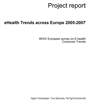 Pre-liminary report of the "WHO/European eHealth Consumer Trends Survey"
Pre-liminary report of the "WHO/European eHealth Consumer Trends Survey"The report presents the results from the 2007 eHealth Trends survey. The number of Internet health users increased from 44% in 2005 to 54% in 2007. The growth in the use of Internet for health purposes is found in all seven countries participating in the survey.
The growth in the use of Internet for health purposes is found in all seven countries participating in the survey. The use of the Internet for health purposes is increasing in Europe.
The project is co-funded by the Program of Community action in the field of Public Health (2003-2008) of the Health and Consumer Protection Directorate-General of the European Commission.
Download Pre-liminary report of the "WHO/European eHealth Consumer Trends Survey" (.pdf, 119KB)
For further information:
Norwegian Centre for Telemedicine
University Hospital of North Norway
P.O. Box 35
N-9038 Tromsø
Telephone: (+47) 77 75 40 00
E-mail: This email address is being protected from spambots. You need JavaScript enabled to view it.
Web: www.telemed.no
About WHO/European eHealth Consumer Trends Survey
This project focuses on the "new patients or consumers" and the digital divide in Europe. The aim of the project is to investigate European health consumer's use of, their attitudes to and their desires with regards to Information and Communication Technologies (ICT) for health purposes, eHealth. For more information, visit www.telemed.no/ehealthtrends.